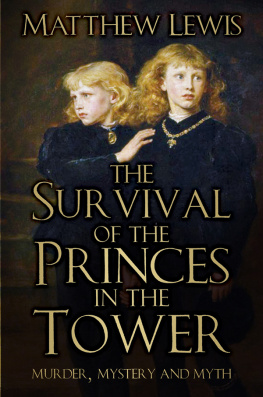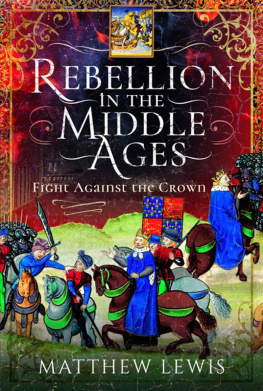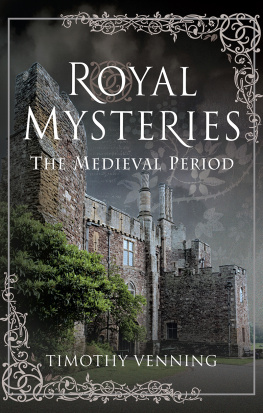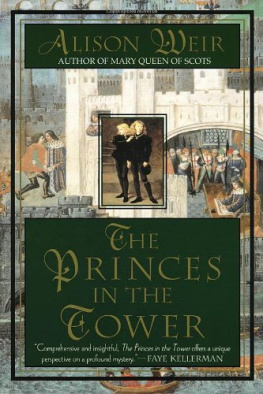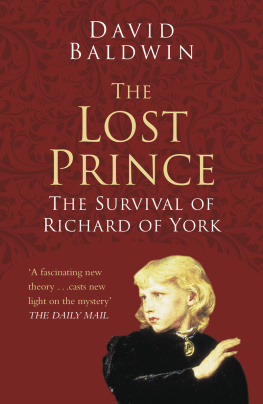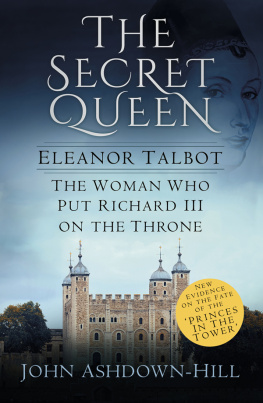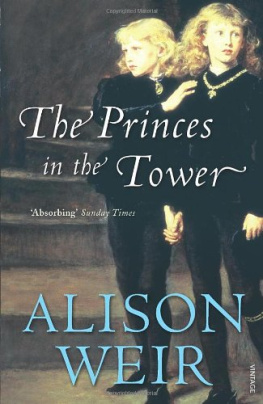

First published in 2017
The History Press
The Mill, Brimscombe Port
Stroud, Gloucestershire, GL5 2QG
www.thehistorypress.co.uk
This ebook edition first published in 2017
All rights reserved
Matthew Lewis, 2017
The right of Matthew Lewis to be identified as the Author of this work has been asserted in accordance with the Copyright, Designs and Patents Act 1988.
This ebook is copyright material and must not be copied, reproduced, transferred, distributed, leased, licensed or publicly performed or used in any way except as specifically permitted in writing by the publishers, as allowed under the terms and conditions under which it was purchased or as strictly permitted by applicable copyright law. Any unauthorised distribution or use of this text may be a direct infringement of the authors and publishers rights, and those responsible may be liable in law accordingly.
EPUB ISBN 978 0 7509 8528 4
Original typesetting by The History Press
eBook converted by Geethik Technologies
Contents
Introduction
The antiquity and general acceptance of an opinion is not assurance of its truth.
Pierre Bayle, Philosopher
For over 500 years, one unsolved murder mystery has exerted an unrelenting and undiminishing grip on the imaginations of people around the world. It is as hotly debated on social media today as it might have been in the bawdy, rush-strewn taverns of England at the end of the fifteenth century. In the fragile, superheated politics of the early Tudor years, it was a hot coal that might burn down the new regime. Foreign rulers at least feigned a deep interest and concern, though each had their own priorities at heart and motives that cannot be ignored behind their words and actions.
This book does not seek to solve a mystery that has evaded any definitive resolution for five centuries. No smoking gun has yet been unearthed and what evidence is available is, almost without exception, circumstantial and open to the broadest interpretations. Work continues in various quarters, not least in private family libraries in England and on the Continent, to uncover something more substantial. The purpose of this book is not to provide a definitive answer to a question that still defies answering, but to look beyond the traditional argument centred around who killed the Princes in the Tower in the summer of 1483 to ask a different question and to see where that inquiry leads.
Rumours and reports sprang up early in the reign of their uncle, King Richard III, that the Princes in the Tower, King Edward V and his younger brother Richard of Shrewsbury, Duke of York, had been put to death, though even in the very eye of the storm, the method and the perpetrator were not clearly known. Men of power in England and abroad did not know what had happened and that is telling and worthy of note. King Richard lay dead on the field of the Battle of Bosworth just two years later, yet his sudden, probably unexpected departure from the pinnacle of government did not allow the truth to become known. If men were afraid to let slip what they knew in 1483, by the end of 1485 it would have been valuable information that would help sure up the burgeoning Tudor government. Henry Tudor, Earl of Richmond, by then King Henry VII, had promised to marry a sister of the Princes, Elizabeth of York, but to do so he had to reverse the Act of Parliament that had made all the siblings illegitimate, thereby handing a far better, and probably more popular, right to the throne to Edward V. It is striking that this information was not forthcoming; no definite proof was provided as the new king took up the reins of government, or at least none that was made public, and the matter was left open, gaping and just asking for trouble, which was not slow to come.
During the sixteenth century, the story of their murders began to solidify, but remained amazingly variable until Shakespeares masterpiece The Tragedie of Richard the Third, written in the early 1590s. The play is a brilliant study of the anti-hero but the greatest tragedy of all is that for centuries it became accepted as the true history of King Richard III so that an overwhelming majority believe that they know Richard was an evil monster who murdered the Duke of Somerset, Edward of Westminster, son of Henry VI, Henry VI himself, Richards brother George and his own wife Anne, with his nephews the Princes in the Tower being the worst of a raft of dastardly deeds. Even though Richard was 2 years old when Somerset was killed at the First Battle of St Albans in 1455, reports place him away from the fighting chasing another section of the army at Tewkesbury when Edward of Westminster was slain, Edward IV ordered the death of their brother George for a string of offences and Anne died of what is believed to have been tuberculosis, these charges have stuck fast. The death of Henry VI is less clear and Richard may well have been involved as Constable of England, but it would not have been without the instruction of Edward IV. The death of his nephews will be explored in the pages that follow, but the popular consciousness finds Richard guilty of all these crimes despite the flaws in the charges, just as he is found guilty of cowardice at the Battle of Bosworth for calling A horse! A horse! My kingdom for a horse. That last charge still has traction despite being diametrically opposed to the text of the play, in which Richard demands a fresh horse to return to the fighting to look for Henry Tudor and despite every hostile source crediting him with the brave death of a warrior.
King Richard III found defenders almost as quickly as he was condemned, with Sir George Buck completing his sympathetic The History of the Life and Reigne of Richard the Third in 1619. In 1791, Jane Austen wrote in her The History of England From the Reign of Henry the 4th to the Death of Charles the 1st that I am rather inclined to suppose him a very respectable Man. Today, the Richard III Society promotes the study of this contentious kings era to better understand the issues swirling around him and a simple tweet on the subject is almost guaranteed to draw passionate responses at both extremes of any argument about him. The deaths of the Princes in the Tower have long been the heaviest millstone around the neck of Richards reputation. It is hard to pinpoint precisely why it remains so high in the public consciousness. There are perhaps two reasons. The first is that it is a case of murdered children, innocents given in sacrifice to a political end that causes revulsion in people now as it would have in 1483. The second is simply that it is a mystery and a mystery, particularly a murder mystery, as fiction book sales will attest, appeals to something deep within human beings.
The prevailing belief has always been that Richard III ordered the murder of his nephews, whether as part of a long and devious plot to take the crown or as a panicked reaction to the chaotic events of the spring of 1483. There have always been theories that it was done at the instigation of someone else, from Henry Stafford, Duke of Buckingham to Henry VII or his mother. Few subscribe to the theory that they survived. This book will seek to explore that possibility more fully. The early Tudor government was perilously insecure, suffered pretenders who challenged its authority in various guises and under the second Tudor king, the famous Henry VIII, became intensely paranoid, lashing out in all directions in fear for its future. The actions of foreign powers might be written off as political machinations aimed at destabilising the Tudor family, but should not be ignored completely, particularly those documents that were never intended for public consumption. Ambassadors might guild the lily, kings, queens, dukes and duchesses might have their own agenda for making statements, but words written to be secret have no cause to lie.
Next page
